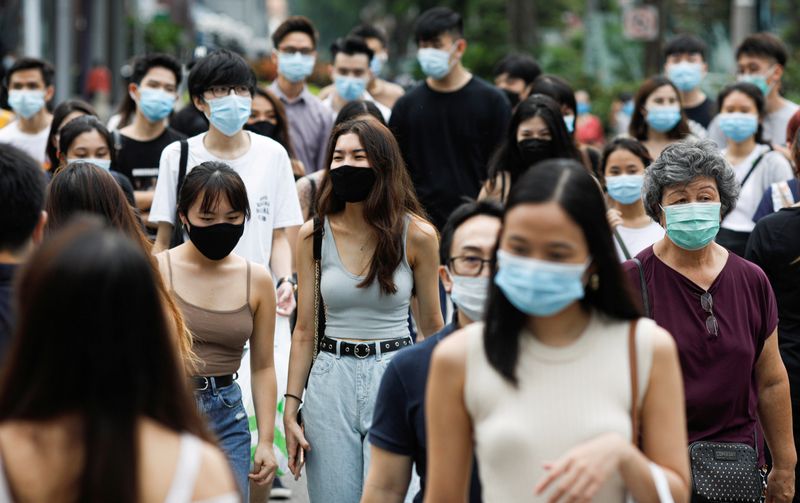By John Geddie and Aradhana Aravindan
SINGAPORE (Reuters) - Singapore has the lowest coronavirus case fatality count globally, with just 27 deaths among the more than 57,000 people who have been infected with COVID-19 in the Southeast Asian island.
At 0.05%, Singapore's death rate is well below the global average of around 3%, according to data compiled by Reuters from countries that have recorded more than 1,000 cases. A comparison with countries with a similar sized population shows a stark difference - Denmark's death rate is around 3%, while Finland's is around 4%. https://tmsnrt.rs/2RxksJF
Further, nobody has died from the disease in Singapore for more than two months, according to its health ministry. The country's leading disease experts said the following are the main factors behind the phenomenon:
INFECTION DEMOGRAPHICS
About 95% of Singapore's COVID-19 infections are among migrant workers, mostly in their 20s or 30s, living in cramped dormitories and employed in labour-intensive sectors such as construction and shipbuilding.
While the parameters of the disease continue to be studied as the pandemic progresses, current global trends suggest its impact has been less severe for younger people, many of whom show few or no symptoms.
DETECTION
Singapore has managed to mitigate the spread of the virus via early detection using aggressive contact tracing and testing that won praise from the World Health Organization (WHO).
It has swabbed nearly 900,000 people, more than 15% of its 5.7 million population, according to official data - one of the highest per capita rates globally.
Dormitory residents have been put on a rostered testing regime, authorities have undertaken mass testing among vulnerable communities like care homes, and anyone over 13 with signs of acute respiratory infection is offered a free test.
"The more we diagnose, then the lower the mortality rate is," said Hsu Li Yang at Saw Swee Hock School of Public Health at National University of Singapore.
HOSPITALISATION
The pre-emptive approach has also applied to treatment. COVID-19 patients above the age of 45 years or with underlying conditions that make them vulnerable are cared for in hospital even if they are otherwise well, doctors said.
"Our care is conventional but done well; fluid management, anticoagulation and both proven drugs and participation in drug trials," said Dale Fisher, a senior consultant at Singapore's National University Hospital.
Singapore was already a medical tourism hub for Southeast Asia, with numerous private hospitals and high quality public healthcare facilities. It also built up bed space for coronavirus patients in cavernous exhibition halls and other temporary facilities to house those with mild or no symptoms.
This prevented the healthcare system from being overwhelmed so that attention and resources could be focused on the more severe cases, doctors said. Singapore currently has no COVID-19 patients in intensive care, while 42 are warded in hospital and a further 490 in temporary facilities.
MANDATORY MASKS
The city-state made masks mandatory in public in April. While experts have said more studies need be done, there is growing evidence that wearing masks helps reduce the prevalance and severity of the virus. The WHO has recommended the use of masks in combination with other social distancing measures.
"We have adopted a good mask culture in Singapore. This makes the disease milder," said Leong Hoe Nam, an infectious diseases expert at the city's Mount Elizabeth Hospital.
CLASSIFICATION
Singapore sticks rigidly to the WHO's case definition for classifying COVID-19 deaths. It does not include non-pneumonia fatalities like those caused by blood or heart issues among COVID-19 patients in its official tally.
"I have no doubt that if the WHO revises its case definitions, some of the non-pneumonia deaths will be reclassified and the mortality rate will change," said Paul Tambyah, president of the Asia Pacific Society of Clinical Microbiology and Infection, without specifying how much it would likely shift.

The health ministry has said its approach is consistent with international practice, although some countries like Britain have taken broader counts. NUH's Fisher said any change from reclassifications in Singapore would be marginal.